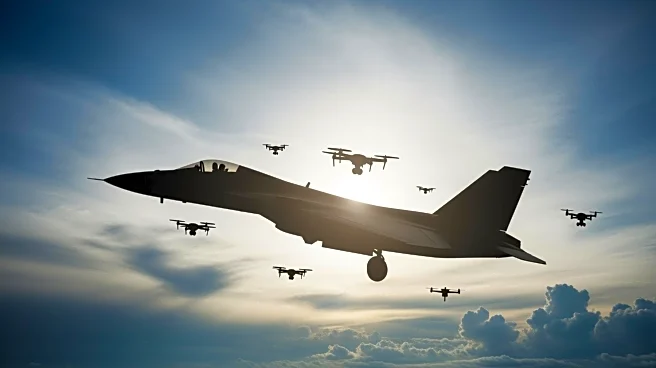What's Happening?
The GCAP fighter jet program, a collaboration between the UK, Japan, and Italy, is focusing on developing a sixth-generation fighter capable of carrying a wide array of armaments and integrating with various
'Loyal Wingman' drones. Group Captain Bill Sanders from the UK defense ministry emphasized the importance of a flexible weapons bay that can accommodate NATO, U.S., and partner nations' weapons, providing commanders with operational flexibility. This approach is informed by lessons from the Ukraine conflict, where rapid depletion of weapon stocks highlighted the need for adaptable supply chains. The program also aims to reduce costs by transitioning from high-cost armaments to more affordable options as enemy defenses weaken.
Why It's Important?
The development of the GCAP fighter jet with versatile weapons and drone integration is significant for enhancing military capabilities and strategic flexibility. By enabling the use of diverse armaments and drones, the program aims to optimize cost-efficiency and operational effectiveness in conflict scenarios. This adaptability is crucial for maintaining military readiness and addressing supply chain challenges, as demonstrated in recent conflicts. The initiative reflects a broader trend towards integrating advanced technologies in defense systems, potentially influencing future military strategies and international collaborations.
What's Next?
The GCAP program will continue to explore integration with Collaborative Combat Aircraft (CCA), with discussions on potential configurations and cost implications. As the program progresses, stakeholders will need to address challenges related to resource allocation and technological compatibility. The ongoing development may lead to further international cooperation and shared platforms, enhancing collective defense capabilities among partner nations.
Beyond the Headlines
The emphasis on flexible weapons and drone integration in the GCAP program highlights the evolving nature of modern warfare, where technological advancements play a critical role. This development may prompt ethical and strategic considerations regarding the use of autonomous systems and the balance between cost and effectiveness in military operations.












